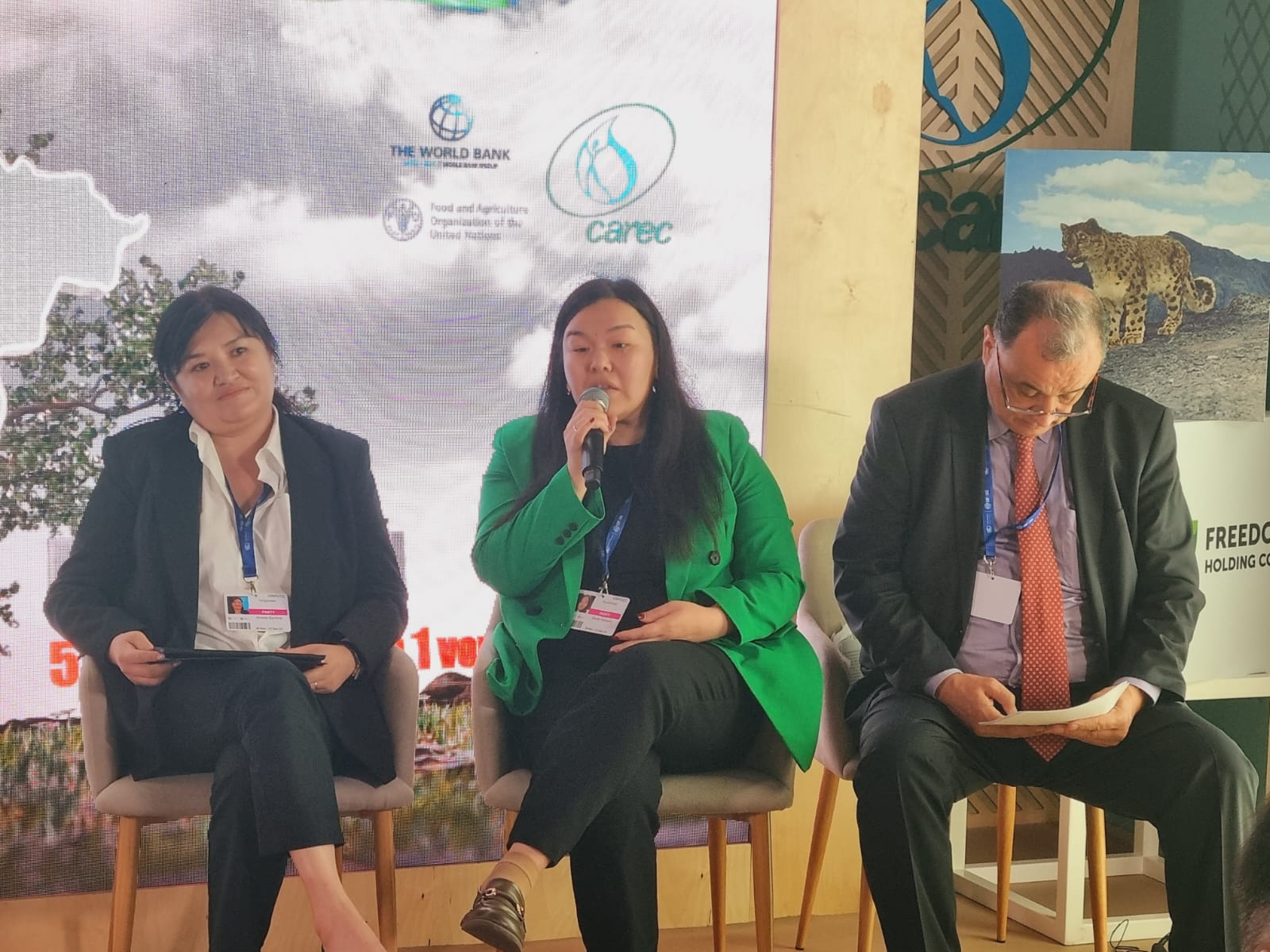Integration and joint efforts are becoming a global trend in solving environmental problems at the international level.
In this context, the work carried out at the level of regular meetings of representatives of the Ministry of Foreign Affairs and parliamentarians of Central Asia demonstrates that the Central Asian countries are working ahead of schedule, the participants of the 10th meeting at the COP28 platform note.
The session's moderator and CAREC consultant, Ikrom Nazarov, outlined several tasks the countries have to solve.
The first is the exchange of experience, improvement of legislation and implementation of climate policy in the Central Asian countries. The second is the exchange of information on progress in the implementation of climate commitments. Third is further prospects for maintaining regional dialogue in the field of climate policy. The fourth is to bring objective information on climate change, adaptation, and mitigation to decision-makers.
Opening the session, Torsten Brezina, Regional Program Manager of the German Society for Technical Cooperation GIZ, stressed the importance of cooperation between the Central Asian countries to achieve common goals. In particular, he noted the creation of a regional strategy for adaptation to climate change, which was agreed at the COP28 platform.
According to him, Germany will continue to provide financial, technical, educational and expert assistance to Central Asian partners. "Ultimately, all the measures taken will lead to an increase in the effectiveness of combating climate change in Central Asia," he stressed.
In turn, CAREC Executive Director Zafar Makhmudov praised the document "Voice of Central Asia" as a joint regional statement on behalf of the governments of the countries of the region and noted the commitment of each Central Asian country to fulfil its obligations under the Paris Agreement.
"Thus, Kazakhstan plans to achieve carbon neutrality by 2060, Kyrgyzstan - by 2050. Even though Tajikistan's share in global greenhouse gas emissions is very low, as more than 98% of electricity is generated from renewable energy sources, the country intends to reduce greenhouse gas emissions by 60-70% by 2030 from 1990 levels. Turkmenistan is making significant practical efforts to implement mitigation and adaptation measures. In 2022, by the Decree of the President of Turkmenistan, the country adopted a Nationally Determined Contribution (NDC) to achieve the goals of the Paris Agreement. Uzbekistan plans to reduce greenhouse gas emissions per unit of GDP by 35% by 2030 and double the energy efficiency of the economy," Zafar Makhmudov said.
“Today, everyone understands that no country will be able to confront climate challenges alone," said Yerbolat Satybaldin, a member of the Majilis of the Parliament of the Republic of Kazakhstan. He spoke about the measures taken in this direction by Kazakhstan, including the issue of regulating the processes of adaptation to climate change at the legislative level in the four most vulnerable sectors - water resources, agriculture, forestry and disaster risk reduction. In particular, Yerbolat Satybaldin noted that one of the novelties of the updated Environmental Code is the introduction of a classification of "green" projects to be financed through "green" bonds and "green" loans."
“The topic of green hydrogen is already becoming one of the strategic areas of our country. The Head of our state, Kassym-Jomart Tokayev, in his last Address to the people of Kazakhstan, instructed to develop hydrogen generation, and we in the Parliament are already thinking about legislative regulation of this issue," Yerbolat Satybaldin said.
Kyrgyz parliamentarian Zhanybek Kydykbaev said that Kyrgyzstan today is actively working systematically to integrate gender equality issues into strategic documents at all levels, including those related to climate change. He specified that Kyrgyzstan has adopted a law on state guarantees and equal rights and opportunities for men and women. "The Kyrgyz Republic is ready to cooperate with our partners, as well as regional and international, to achieve common sustainable development goals and support all initiatives aimed at combating climate change," Zhanybek Kydykbayev emphasized.
Another important problem - the melting of glaciers - was touched upon by the deputy from Tajikistan Idizoda Faizali. "Glaciers are an important component of the hydrological cycle, and their accelerated melting has serious impacts on climate, environment, human health and sustainable development," he said. Idizoda Faizali said that Tajikistan will hold a high-level international conference on this topic in 2025.
Azat Seidibayev, a deputy from Turkmenistan, noted the positive impact of the format of the meeting, which provides for the work of the Ministry of Foreign Affairs and parliamentarians. "Holding a dialogue in such a format aimed at improving the legislative activities of adaptation and mitigation of climate change, familiarizing ourselves with information and analysis of international experts, helped us in identifying the upcoming tasks, as well as developing cooperation in this area," he said.
All participants of the session expressed confidence in further cooperation in adapting to climate change and mitigating the effects of this change.
It should be noted that on December 3, the 10th meeting of representatives of the Ministry of Foreign Affairs and Parliamentarians of Central Asian countries was held in Dubai (UAE) in December at the COP28 platform.
By press Service of the Ministry of Ecology and Natural Resources of the Republic of Kazakhstan



